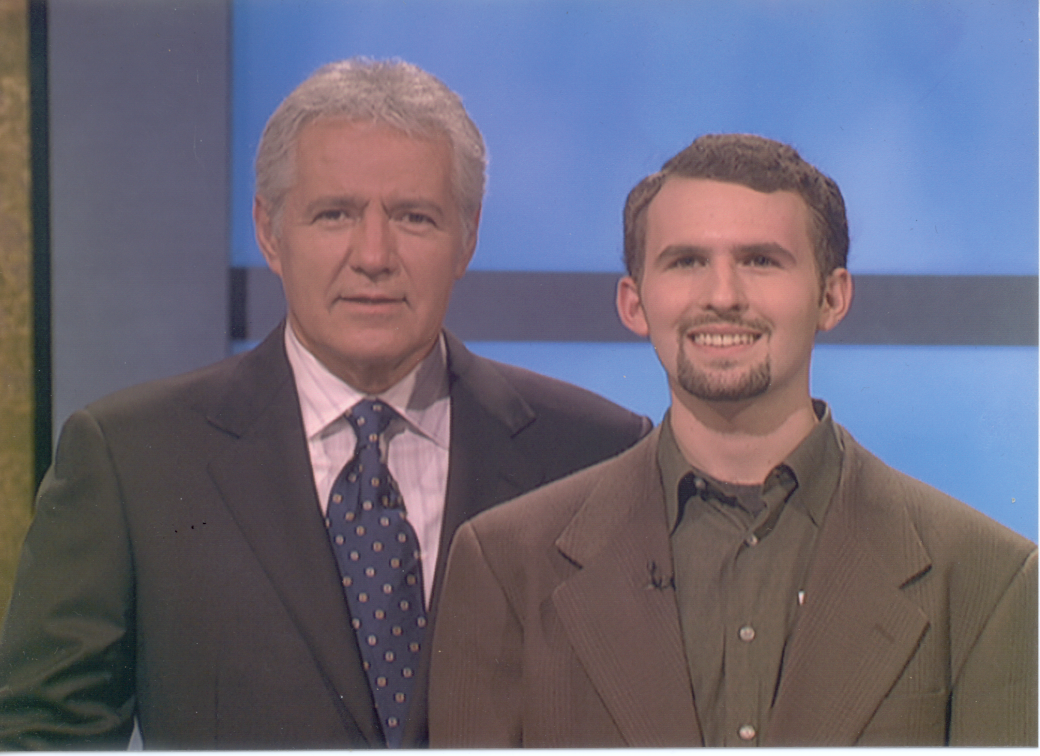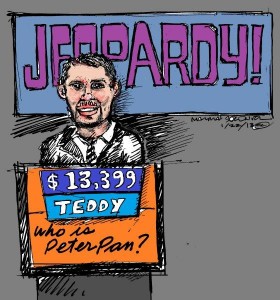IN JEOPARDY
At a Detroit wedding, the bride came down the aisle to Barbra Streisand recordings. She paused several times to read from her childhood diaries. She had 109 journals. (She read only from a handful.)
Eight years later, the bride emailed me and asked if I remembered her.
Yes. And I remembered the bridal dance we had played, and how we opened for a soul band (a good band), and how I announced the bridal party individually; one groomsman was Billy Wisse.
I had said Billy Weiss. He thanked me. I explained to him, “There’s a Ruth Wisse, a Yiddishist and professor at Harvard. I’ve heard the name pronounced before.”
“That’s my mother,” Billy said.
“No! Where do you teach?” I said. The Wisse family is scholarly; David Roskies, Ruth Wisse’s brother, is a professor at the Jewish Theological Seminary.
Billy said, “I write questions for Jeopardy.”
“That’s a job?” I said, pulling out a pen and jotting down Billy’s email address. My son Teddy — a college student then — would love a job at Jeopardy upon graduation. Teddy was on Brandeis’ Quiz Bowl team. (Quiz Bowl is Jeopardy minus the money.)
Two years later, Brandeis played in Los Angeles for the national championship. Teddy was on the Brandeis team. I gave Billy’s email to Ted.
Ted and his Brandeis teammates met with Billy Wisse for breakfast at Canter’s Deli.
Two years after that (2004), Ted got a business call at our house. He had recently graduated college. He wouldn’t pick up the phone. I yelled, “Pick up the phone, Teddy! It’s for you.”
Sony was on the line.
Sony owns Jeopardy. Sony offered Ted a slot on Jeopardy as a contestant. Sony sent a contract via FedEx. One paragraph read (paraphrased): “Do you know anybody from Sony or Jeopardy? If so, you can not be on the show.”
Teddy did not know Billy Wisse! Teddy and Billy Wisse ate breakfast two years prior for one-half hour. Also, there had been other Brandeis players at that breakfast.
At Sony Studios in Culver City, California, Billy Wisse stood by a computer at the edge of the Jeopardy set. Alex Trebek, the show’s host, wore a cast on his wrist. He had fallen off a ladder, he told the studio audience. He had been cleaning his gutters. Sounded odd to me. (I was in the peanut gallery.) A Hollywood guy cleans his own gutters? Maybe. There are low gutters in California.

Alex Trebek and Ted Stratton, 2004. (Show aired in 2005)
Jeopardy tapes five shows a day. The show’s contestants for that day sat in rows isolated from the studio audience. Whenever an on-deck contestant went to the bathroom, he or she was escorted by a guard from Standards and Practices, which monitored cheating.
The first game was between an Idaho man, a Washington state woman, and the defending champ, “a schoolteacher from Lancaster, Ohio.”
The Jeopardy stagehand said, “Lights, camera.” But no “action.” Wisse and other Jeopardy employees huddled at the side of the set. They looked at computers and talked to each other. This went on for about a half hour.
Wisse, you do not know my son. Have rachmones (pity), Wisse. You see 11 Jeopardy contestants per day; they’re mostly all young white guys who look alike. You do not know Teddy!
The Jeopardy people couldn’t locate the appropriate random packet of questions for the first game. That was the hold-up. Everything had to be kosher — up to Standards and Practices.
Teddy didn’t play that morning.
Lunch break was at Quizno’s for the peanut gallery. (The contestants ate in the Sony cafeteria.) At Quizno’s, the girl friend of one contestant said, “I don’t care if Jonathan wins or loses. I don’t love him for his game playing.”
Shut up. I was so nervous I couldn’t eat.
Teddy didn’t play the game after lunch either. I asked an usher, “What if my son doesn’t play today?”
She shrugged.
Teddy made it onto the final game of the day. He faced a Boston book editor — the defending champ — and “a graduate student originally from Johnson City, Tennessee.” That was Jeopardy-speak for “a graduate student now living in Cambridge, Massachusetts, doing a post-doc at MIT.”
Ted did well in the Double Jeopardy category “Our Lady,” about Catholic shrines. The “Our Lady” questions covered Our Lady of Czestochowa (Poland), Our Lady of Gethsemane (Kentucky) and several others. This is what my son learned at Brandeis.
Heading into Final Jeopardy, the Tennessee grad student was in first place. Ted was in second, and the defending champ, Boston book editor, was in third.
The Final Jeopardy category was Fictional Children. The answer was: “This boy, introduced in a 1902 book, flew away from his mother when he was 7 days old.”
I felt like I was watching my kid line up a 50-yard field goal at the Ohio State-Michigan game with one second left on the clock. That is the weird part about being a parent — all that collateral joy and pain. Merv Griffin’s Jeopardy think-music ended.
The Boston editor, in third place, answered, “Who is Peter Pan?”
Right-o. She went up to $10,900.
Teddy said, “Who is Peter Pan?” Right. He went up to $13,399.
The graduate student from Tennessee said, “Who is the Little Prince?” He went down to $7,900.
Alex Trebek announced, “The new champion, Ted Stratton, a reporter from Cleveland Heights, Ohio!”
—
Footnote: For $500, “Who is Billy Wisse?” Answer: a mentsh.
For a blow-by-blow of the game, see Robert KS’ J! Archive.





0 comments
Kick things off by filling out the form below.
Leave a Comment